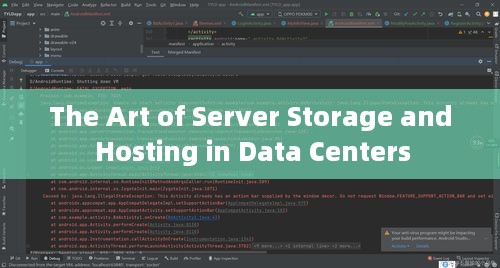The Art of Server Storage and Hosting in Data Centers
数据中心服务器存储与托管的艺术:,,在当今的数字化时代,数据已成为推动业务增长的关键因素。如何有效地存储和保护这些数据,以及如何在需要时迅速访问它们,成为了一个至关重要的挑战。本文探讨了在数据中心中服务器存储和托管的各个方面,包括选择合适的存储解决方案、优化存储性能、提高数据可用性以及确保数据安全的策略。通过采用先进的硬件和软件技术,结合专业的管理实践,企业可以构建一个既高效又安全的存储系统,从而支持其业务的持续增长。
Introduction
In the digital age, data is king. With businesses and individuals alike investing heavily in cloud-based solutions to store, process, and manage their information, the importance of server storage and hosting cannot be overstated. In a world where technology advances at an unprecedented pace, the concept of server storage and hosting in data centers has evolved from a basic need into a sophisticated practice. This article will delve into the nuances of server storage and hosting, discussing how they work, the benefits they offer, and the critical factors that determine the success of these services.

Server Storage: What It Is and Why It Matters
Server storage refers to the physical space allocated to store servers, databases, applications, and other computing resources within a data center. The primary objective of server storage is to provide reliable, efficient, and scalable infrastructure for hosting and processing data. As technology continues to push the boundaries of what is possible with hardware, software, and network configurations, server storage has become an essential component of any modern data center.
The Benefits of High-Quality Server Storage
High-quality server storage offers several key advantages to both businesses and individuals. First and foremost, it ensures data security and integrity, as well as availability and redundancy. By using secure, reliable storage facilities, data can be backed up regularly, reducing the risk of loss or corruption due to hardware failures or natural disasters. Additionally, high-quality storage can handle large volumes of data quickly and efficiently, allowing businesses to scale up or down depending on demand without compromising performance.
Furthermore, server storage provides scalability – the ability to accommodate growth in data size and complexity without disrupting operations. With advanced storage technologies such as solid-state drives (SSDs), flash memory, and distributed file systems, data can be stored across multiple nodes or even across multiple data centers, ensuring high availability and fault tolerance. This not only reduces costs but also enables organizations to maintain continuity of service during times of crisis or disaster.
Finally, server storage can enhance user experience by providing faster access to data, improving application performance, and enabling more complex data analytics capabilities. For instance, virtualized storage allows multiple applications to share a single pool of storage while still providing individual access to specific data sets. This not only saves space but also optimizes resource usage, enhancing overall efficiency.

Server Hosting: How It Works and Its Significance
While server storage is crucial for preserving and managing data, hosting is the actual process of storing this data on the servers. Hosting involves configuring and managing the hardware, software, and networking components needed to support the running of applications and processes within the data center. A well-designed hosting strategy ensures that data is accessible when needed, optimized for performance, and protected from potential threats.
Hosting plays a vital role in ensuring data availability and reliability, which are critical for many industries. When data is hosted in a data center, it is protected from external threats like cyber attacks, natural disasters, and even human error. Additionally, hosting provides flexibility in terms of scalability – if a company experiences sudden increases in traffic or requires more resources, it can easily scale up or down by adding more servers or utilizing virtual machines.
Moreover, hosting allows organizations to take advantage of economies of scale by consolidating data and applications across multiple servers. This not only enhances efficiency but also reduces costs associated with managing and maintaining individual servers. Furthermore, hosting enables organizations to adopt new technologies, such as cloud computing, that enable greater flexibility, scalability, and innovation.
Factors to Consider when Selecting Server Storage and Hosting Services
When selecting server storage and hosting services, there are several factors to consider to ensure optimal performance and cost-effectiveness. Firstly, the organization's needs must be clearly defined, including the type of data being stored, the expected growth rate, and the level of security required. Secondly, the provider's reputation and track record should be evaluated; a reputable provider with a proven track record of delivering on time, on budget, and with high levels of customer satisfaction is ideal.

Thirdly, the provider's technical expertise and capabilities should be assessed; a provider with advanced storage technologies such as NVMe SSDs or hybrid cloud solutions that combine on-premises and cloud-based solutions can offer superior performance and flexibility. Additionally, the provider's support and maintenance services should be considered; a dependable support team that provides regular monitoring and proactive maintenance can help minimize downtime and ensure optimal uptime.
Conclusion
Server storage and hosting in data centers have become cornerstones of modern IT infrastructure. By leveraging advanced technologies like SSDs, virtualization, and distributed file systems, businesses and individuals alike can achieve unprecedented levels of performance, reliability, and scalability. However, selecting the right hosting and storage solutions requires careful consideration of various factors such as security, cost-effectiveness, and technical expertise.
As the landscape of data management continues to evolve, the importance of server storage and hosting in data centers will only continue to grow. By staying ahead of the curve in terms of technological advancements, companies can ensure their data remains secure, accessible, and optimized for maximum value. Whether it's through strategic partnerships with trusted providers, innovative solutions, or a commitment to continuous learning and improvement, the future of data management is bright – and it all starts with the power of a well-managed server storage and hosting solution in a data center.
与本文知识相关的文章:



